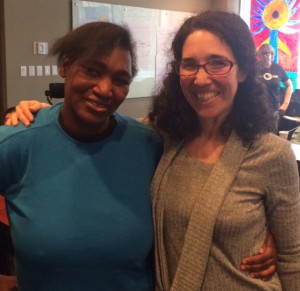The Centre for Addiction and Mental Health (CAMH) is opening a new research hub that will address the needs of people with both developmental and psychiatric disabilities, a population that is too often overlooked.
Shineeca is a Self-Advocate with Community Living Toronto who has lived experience in the mental health system and is studying to become a Community Services Worker.
Dr. Yona Lunsky, the head of the new centre at CAMH, is interviewed by Shineeca:
Shineeca: What is the new centre?
Yona: We are researching mental health in a way that involves people with developmental disabilities. CAMH already has a program for people with developmental disabilities and mental health issues called the Adult Neurodevelopmental Service. There you can share your story and get some help. The new centre will try to answer questions about what works and what doesn’t work when treating people with both developmental and psychiatric disabilities. If we don’t study it, we won’t know what works. How do we know how to treat depression in someone with a developmental disability? Do they need more time in therapy? Do we need to explain things differently? We also want to teach new healthcare providers how to do a better job working with people with developmental disabilities.
Shineeca: Will the new centre be accessible?
Yona: The new centre is accessible because it is part of the CAMH building located at Queen St W and Ossington Ave that is accessible. It has automatic doors, elevators and accessible bathrooms.
Shineeca: How will the new centre help people with developmental disabilities and mental health issues?
Yona: There are four parts that make up the new centre: Research, Teaching, Clinical Innovation and Knowledge Exchange. Knowledge exchange happened recently through the Bell Let’s Talk Campaign (#BellLetsTalk). We put together a presentation sharing information about why it is important to talk about mental health. We might also share information about things like what to do when you go to a hospital – on our website. The work we do will help develop new ways to give clinical services. That is the “innovation.” We might teach people how to deal with frustration without hurting others or teach techniques like mindfulness to deal with stress. We are studying treatments to better help people with developmental disabilities and mental health issues.
Shineeca: How can I be involved in research at the new centre?
Yona: You can tell us what research is important to you, and help us in teaching about disabilities and you can also be in the research studies that we do.
Thank you, Yona, for taking the time to tell us about how Self-Advocates can get involved at the new centre at CAMH! For information please get in touch with our coordinator:
Sue Hutton at shutton@cltoronto.ca
Helpful Links:
Health Passports and Communication Tools:
Better Practice, Better Health Video:
https://www.youtube.com/watch?v=7gRmdbEe65c&list=PLNuPQneaGMwCgYIDHdawgSQQA9AYoe8hx
Download the full newsletter: Connections March 2018
![Community Living Toronto [logo]](https://cltoronto.ca/wp-content/themes/communitylivingtoronto2/img/clt-logo.jpg)
